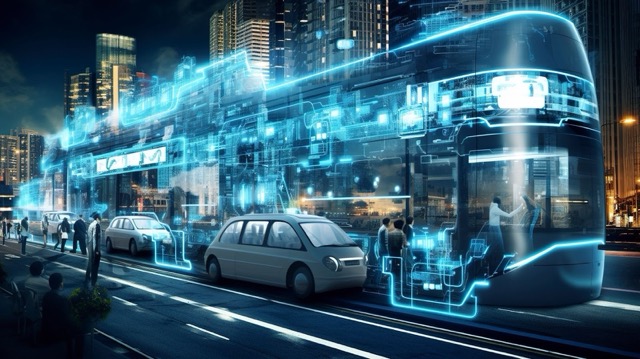Artificial Intelligence (AI) is rapidly transforming the transportation industry, introducing innovations that make travel safer, more efficient, and more convenient. From autonomous vehicles to smart traffic management systems, AI is already demonstrating significant advancements, impacting various aspects of transportation services.
In this article, experts from Euristiq will discuss the current achievements of ai in transportation, its development prospects, key benefits. They will also share real-world examples of successful applications to illustrate how AI is changing the game in this dynamic industry.

AI achievements in transportation
AI is already playing a crucial role in the transportation sector, showcasing impressive achievements. For instance, Tesla has integrated autopilot features into its cars, allowing them to drive, stop, and maneuver autonomously under certain conditions. The company is also developing full self-driving technologies, which promise to offer even higher levels of safety and convenience for drivers.
Waymo, owned by Alphabet, is actively testing autonomous vehicles on public roads. In some regions of the United States, Waymo already offers robotaxi services, providing passengers with fully autonomous rides. These vehicles are equipped with advanced AI systems that ensure safe and comfortable travel.
AI is also used for real-time traffic management, congestion prediction, and route optimization. For example, Singapore has implemented smart traffic management systems that analyze data from cameras and sensors to improve transportation infrastructure and reduce traffic jams.
Additionally, AI helps optimize logistics and freight processes. Uber Freight uses AI to manage freight operations, enabling more efficient resource use, cost reduction, and improved delivery times.

Benefits of AI for transportation
The use of AI in transportation offers numerous benefits:
Enhanced safety. AI can analyze vast amounts of data in real-time, predict, and prevent accidents. For example, driver assistance systems can warn of potential dangers and automatically take measures to prevent collisions.
Efficiency and resource savings. Optimizing routes and managing traffic help reduce travel time, fuel consumption, and harmful emissions. This is particularly important given rising fuel costs and the push to reduce environmental footprints.
Improved customer service. AI enables the creation of personalized services that cater to passengers’ preferences and needs, making trips more comfortable and meeting customer expectations.
Cost reduction. Automation reduces the need for human labor and lowers operational costs, allowing companies to allocate resources to development and innovation.
Prospects of AI in various transportation sectors
AI has immense potential to transform various sectors of transportation.
Passenger Transport. The future holds further development of autonomous vehicles and advanced driver assistance systems (ADAS), leading to increased road safety and enhanced driving experiences. AI development will also enable more personalized services for drivers and passengers, such as intelligent navigation systems and road condition forecasting.
Freight and Logistics. In freight transportation, AI will play a key role in automating supply chain management, optimizing routes, and improving cargo tracking. Autonomous trucks, like those being developed by TuSimple, can significantly reduce transportation costs and enhance delivery efficiency.
Public Transport. AI will be used to optimize public transport routes, improve schedules, and enhance passenger convenience. Smart traffic management systems will help reduce travel times and improve service quality.
Aviation and maritime transport. In aviation, AI will be used to automate flight management, improve safety, and enhance operational efficiency. In maritime transport, AI will help optimize ship routes, improve port management, and reduce downtime.
Recommendations for integrating AI into transportation systems
Euristiq experts have shared key factors to consider for the successful integration of AI into transportation systems:
- Investing in research and development: companies must be prepared to invest in long-term projects, explore new algorithms, and enhance existing systems;
- collaborating with technology partners: partners provide the necessary resources and expertise to develop and implement advanced technologies;
- employee training and adaptation: staff must understand how to use AI in their daily work and be ready to adapt to new processes and tools;
- developing regulatory frameworks: standards and regulations must be established to govern AI usage and ensure compliance;
- focus on safety and reliability: systems must be protected from cyberattacks, and their algorithms must be reliable and predictable;
- data analysis and monitoring: continuous analysis and monitoring help identify and resolve issues, improve algorithms, and adapt systems to changing conditions.
AI is fundamentally transforming the transportation industry, making it safer, more efficient, and more convenient for users. Current achievements and future prospects of AI in various transportation sectors indicate the significant potential of these technologies. Implementing AI in transportation helps solve complex problems and improve people’s quality of life by making travel more comfortable and safer.
















